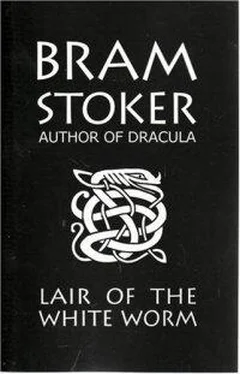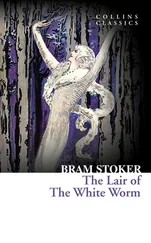Брэм Стокер - The Lair of the White Worm
Здесь есть возможность читать онлайн «Брэм Стокер - The Lair of the White Worm» весь текст электронной книги совершенно бесплатно (целиком полную версию без сокращений). В некоторых случаях можно слушать аудио, скачать через торрент в формате fb2 и присутствует краткое содержание. Жанр: Ужасы и Мистика, на английском языке. Описание произведения, (предисловие) а так же отзывы посетителей доступны на портале библиотеки ЛибКат.
- Название:The Lair of the White Worm
- Автор:
- Жанр:
- Год:неизвестен
- ISBN:нет данных
- Рейтинг книги:5 / 5. Голосов: 1
-
Избранное:Добавить в избранное
- Отзывы:
-
Ваша оценка:
- 100
- 1
- 2
- 3
- 4
- 5
The Lair of the White Worm: краткое содержание, описание и аннотация
Предлагаем к чтению аннотацию, описание, краткое содержание или предисловие (зависит от того, что написал сам автор книги «The Lair of the White Worm»). Если вы не нашли необходимую информацию о книге — напишите в комментариях, мы постараемся отыскать её.
The Lair of the White Worm — читать онлайн бесплатно полную книгу (весь текст) целиком
Ниже представлен текст книги, разбитый по страницам. Система сохранения места последней прочитанной страницы, позволяет с удобством читать онлайн бесплатно книгу «The Lair of the White Worm», без необходимости каждый раз заново искать на чём Вы остановились. Поставьте закладку, и сможете в любой момент перейти на страницу, на которой закончили чтение.
Интервал:
Закладка:
"I gather from your uncle—by the way, I suppose we had better speak of you as uncle and nephew, instead of going into exact relationship? In fact, your uncle is so old and dear a friend, that, with your permission, I shall drop formality with you altogether and speak of you and to you as Adam, as though you were his son."
"I should like," answered the young man, "nothing better!"
The answer warmed the hearts of both the old men, but, with the usual avoidance of Englishmen of emotional subjects personal to themselves, they instinctively returned to the previous question. Sir Nathaniel took the lead.
"I understand, Adam, that your uncle has posted you regarding the relationships of the Caswall family?"
"Partly, sir; but I understood that I was to hear minuter details from you—if you would be so good."
"I shall be delighted to tell you anything so far as my knowledge goes. Well, the first Caswall in our immediate record is an Edgar, head of the family and owner of the estate, who came into his kingdom just about the time that George III. did. He had one son of about twenty–four. There was a violent quarrel between the two. No one of this generation has any idea of the cause; but, considering the family characteristics, we may take it for granted that though it was deep and violent, it was on the surface trivial."
"The result of the quarrel was that the son left the house without a reconciliation or without even telling his father where he was going. He never came back again. A few years after, he died, without having in the meantime exchanged a word or a letter with his father. He married abroad and left one son, who seems to have been brought up in ignorance of all belonging to him. The gulf between them appears to have been unbridgable; for in time this son married and in turn had a son, but neither joy nor sorrow brought the sundered together. Under such conditions no rapprochement was to be looked for, and an utter indifference, founded at best on ignorance, took the place of family affection—even on community of interests. It was only due to the watchfulness of the lawyers that the birth of this new heir was ever made known. He actually spent a few months in the ancestral home."
"After this the family interest merely rested on heirship of the estate. As no other children have been born to any of the newer generations in the intervening years, all hopes of heritage are now centred in the grandson of this man."
"Now, it will be well for you to bear in mind the prevailing characteristics of this race. These were well preserved and unchanging; one and all they are the same: cold, selfish, dominant, reckless of consequences in pursuit of their own will. It was not that they did not keep faith, though that was a matter which gave them little concern, but that they took care to think beforehand of what they should do in order to gain their own ends. If they should make a mistake, someone else should bear the burthen of it. This was so perpetually recurrent that it seemed to be a part of a fixed policy. It was no wonder that, whatever changes took place, they were always ensured in their own possessions. They were absolutely cold and hard by nature. Not one of them—so far as we have any knowledge—was ever known to be touched by the softer sentiments, to swerve from his purpose, or hold his hand in obedience to the dictates of his heart. The pictures and effigies of them all show their adherence to the early Roman type. Their eyes were full; their hair, of raven blackness, grew thick and close and curly. Their figures were massive and typical of strength."
"The thick black hair, growing low down on the neck, told of vast physical strength and endurance. But the most remarkable characteristic is the eyes. Black, piercing, almost unendurable, they seem to contain in themselves a remarkable will power which there is no gainsaying. It is a power that is partly racial and partly individual: a power impregnated with some mysterious quality, partly hypnotic, partly mesmeric, which seems to take away from eyes that meet them all power of resistance—nay, all power of wishing to resist. With eyes like those, set in that all–commanding face, one would need to be strong indeed to think of resisting the inflexible will that lay behind."
"You may think, Adam, that all this is imagination on my part, especially as I have never seen any of them. So it is, but imagination based on deep study. I have made use of all I know or can surmise logically regarding this strange race. With such strange compelling qualities, is it any wonder that there is abroad an idea that in the race there is some demoniac possession, which tends to a more definite belief that certain individuals have in the past sold themselves to the Devil?"
"But I think we had better go to bed now. We have a lot to get through to–morrow, and I want you to have your brain clear, and all your susceptibilities fresh. Moreover, I want you to come with me for an early walk, during which we may notice, whilst the matter is fresh in our minds, the peculiar disposition of this place—not merely your grand–uncle’s estate, but the lie of the country around it. There are many things on which we may seek—and perhaps find—enlightenment. The more we know at the start, the more things which may come into our view will develop themselves."
CHAPTER III
DIANA’S GROVE
Curiosity took Adam Salton out of bed in the early morning, but when he had dressed and gone downstairs; he found that, early as he was, Sir Nathaniel was ahead of him. The old gentleman was quite prepared for a long walk, and they started at once.
Sir Nathaniel, without speaking, led the way to the east, down the hill. When they had descended and risen again, they found themselves on the eastern brink of a steep hill. It was of lesser height than that on which the Castle was situated; but it was so placed that it commanded the various hills that crowned the ridge. All along the ridge the rock cropped out, bare and bleak, but broken in rough natural castellation. The form of the ridge was a segment of a circle, with the higher points inland to the west. In the centre rose the Castle, on the highest point of all. Between the various rocky excrescences were groups of trees of various sizes and heights, amongst some of which were what, in the early morning light, looked like ruins. These—whatever they were—were of massive grey stone, probably limestone rudely cut—if indeed they were not shaped naturally. The fall of the ground was steep all along the ridge, so steep that here and there both trees and rocks and buildings seemed to overhang the plain far below, through which ran many streams.
Sir Nathaniel stopped and looked around, as though to lose nothing of the effect. The sun had climbed the eastern sky and was making all details clear. He pointed with a sweeping gesture, as though calling Adam’s attention to the extent of the view. Having done so, he covered the ground more slowly, as though inviting attention to detail. Adam was a willing and attentive pupil, and followed his motions exactly, missing—or trying to miss—nothing.
"I have brought you here, Adam, because it seems to me that this is the spot on which to begin our investigations. You have now in front of you almost the whole of the ancient kingdom of Mercia. In fact, we see the whole of it except that furthest part, which is covered by the Welsh Marches and those parts which are hidden from where we stand by the high ground of the immediate west. We can see—theoretically—the whole of the eastern bound of the kingdom, which ran south from the Humber to the Wash. I want you to bear in mind the trend of the ground, for some time, sooner or later, we shall do well to have it in our mind’s eye when we are considering the ancient traditions and superstitions, and are trying to find the rationale of them. Each legend, each superstition which we receive, will help in the understanding and possible elucidation of the others. And as all such have a local basis, we can come closer to the truth—or the probability—by knowing the local conditions as we go along. It will help us to bring to our aid such geological truth as we may have between us. For instance, the building materials used in various ages can afford their own lessons to understanding eyes. The very heights and shapes and materials of these hills—nay, even of the wide plain that lies between us and the sea—have in themselves the materials of enlightening books."
Читать дальшеИнтервал:
Закладка:
Похожие книги на «The Lair of the White Worm»
Представляем Вашему вниманию похожие книги на «The Lair of the White Worm» списком для выбора. Мы отобрали схожую по названию и смыслу литературу в надежде предоставить читателям больше вариантов отыскать новые, интересные, ещё непрочитанные произведения.
Обсуждение, отзывы о книге «The Lair of the White Worm» и просто собственные мнения читателей. Оставьте ваши комментарии, напишите, что Вы думаете о произведении, его смысле или главных героях. Укажите что конкретно понравилось, а что нет, и почему Вы так считаете.












